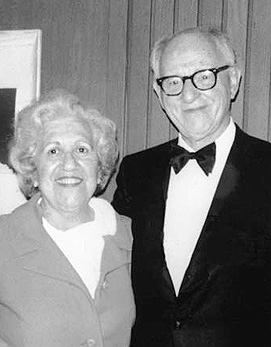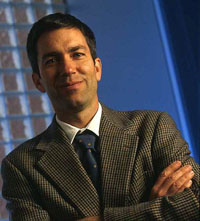 RAYMOND LUBLIN, Med 1929, a general surgeon who practiced in East Hartford, Connecticut, opened that city’s first hospital in 1939. He invested the money he made from his private practice into the hospital’s improvement and development. Dr. Lublin’s contributions to East Hartford were not confined to the hospital: he also built high-quality townhouses and rented them to low-income families and played violin with the community chamber ensemble.
RAYMOND LUBLIN, Med 1929, a general surgeon who practiced in East Hartford, Connecticut, opened that city’s first hospital in 1939. He invested the money he made from his private practice into the hospital’s improvement and development. Dr. Lublin’s contributions to East Hartford were not confined to the hospital: he also built high-quality townhouses and rented them to low-income families and played violin with the community chamber ensemble.
His wife, ANNA LUBLIN, worked at his side, responsible for payroll and other administrative tasks in the early years of the hospital. She also was active in community affairs and founded the Women’s Auxiliary of the Hartford County Medical Society. After Dr. Lublin died in 1985, Mrs. Lublin continued her husband’s tradition of generous donations to Johns Hopkins.
The Lublins established this professorship to improve the health care of older Americans through research and through the education of health care professionals.
“The Johns Hopkins School of Medicine has always been a top priority for us.”
– Anna Lublin
Held by Jeremy D. Walston
 JEREMY D. WALSTON, MD, is the Raymond and Anna Lublin Professor of Medicine. Dr. Walston is committed to research, clinical practice, and education in geriatric medicine. He is an expert in the area of frailty, the principal investigator of the Johns Hopkins Older American Independence Center, and the co-director of the Biology of Frailty Program.
JEREMY D. WALSTON, MD, is the Raymond and Anna Lublin Professor of Medicine. Dr. Walston is committed to research, clinical practice, and education in geriatric medicine. He is an expert in the area of frailty, the principal investigator of the Johns Hopkins Older American Independence Center, and the co-director of the Biology of Frailty Program.
Dr. Walston has produced nearly 100 peer-reviewed publications and is the principal investigator on several ground-breaking studies that connect aging, chronic inflammation, and the development of frailty and chronic disease. He has mentored multiple geriatric medicine trainees who are now faculty physicians at The Johns Hopkins University, University of Texas San Antonio, University of Maryland, and Mt. Sinai School of Medicine in New York. He continues to lead important training programs for fellows, students, and junior faculty who have been highly successful in receiving grants and awards for their ongoing research projects related to frailty. Dr. Walston continues to play a leading role in setting the national aging research agenda through his leadership and participation in committees of the American Geriatrics Society and on study sections and review panels for the National Institute on Aging.
 RAYMOND LUBLIN, Med 1929, a general surgeon who practiced in East Hartford, Connecticut, opened that city’s first hospital in 1939. He invested the money he made from his private practice into the hospital’s improvement and development. Dr. Lublin’s contributions to East Hartford were not confined to the hospital: he also built high-quality townhouses and rented them to low-income families and played violin with the community chamber ensemble.
RAYMOND LUBLIN, Med 1929, a general surgeon who practiced in East Hartford, Connecticut, opened that city’s first hospital in 1939. He invested the money he made from his private practice into the hospital’s improvement and development. Dr. Lublin’s contributions to East Hartford were not confined to the hospital: he also built high-quality townhouses and rented them to low-income families and played violin with the community chamber ensemble.